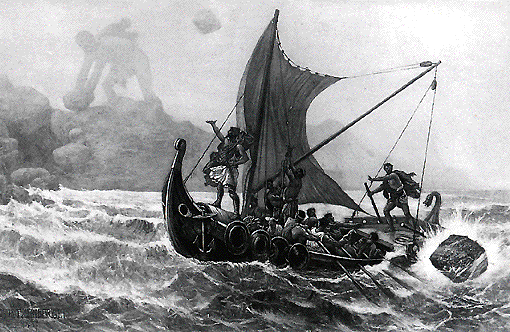Wednesday, March 28, 2012
Monday, March 26, 2012
Explaining the 14 Year Gap
I would explain the fourteen year gap in Shakespeare's Pericles in a way that emphasizes Dionyza's envious and evil nature while highlighting Pericles' noble and caring personality.
First, Pericles would return to Tyre after leaving Marina in Tarsus with Cleon and Dionyza. I would have him state that he wishes to reunite with his daughter, but he gets caught up in Tyre's politics and social problems and whatnot. Since he has been gone for a while, he must regain the trust of his people again after his relatively long period of absence. After around a year of gaining his people's trust, he sends a letter to Tarsus regarding whether he can get his daughter. However, the letter never reaches Tarsus because of a tempest on the delivery's way to Tarsus on the Mediterranean Sea. This would keep Shakespeare's focus on the water very consistent throughout the play. By the time his second letter, sent by land, reaches Tarsus, a considerable amount of time has passed. Back in Tarsus, Dionyza resembles a different person from the first half of the play. She begins to madly covet Marina, maybe even love her more than her own daughter, which would cause conflict within herself later on. She replies to Pericles convincing him to leave Marina there, where she can live with a mother-like person (Dionyza) around, since Dionyza knows of Thaisa's unfortunate event. Then Pericles, the good father that he is, is persuaded that life would be better in Tarsus for Marina since he, a single-parent and ruling king, wouldn't be able to provide what he believes Dionyza can provide. Pericles agrees to do so with the condition that Marina knows of his existence and can get her back when the time is right for both Pericles and Marina. Then, as time passes (around ten years), maybe a dumb show could show Dionyza's transformation into Cinderella's evil stepmother due to jealousy. Pericles occasionally receives updates on Marina and even letters from here (written by someone else, explaining her "lovely" life), thinking that everything is perfect, when it isn't. This would conclude my explanation for the fourteen year gap.
Wednesday, March 21, 2012
The Importance of Central Metaphors
In Pericles, the sea is a central metaphor to the play. It stands for many things that don't seem too similar at first glances. First the sea represents unpredictability and true force. Especially in Pericles' time, one couldn't predict an ocean storm or whether the water will be choppy or smooth. This unpredictability leads to the sea's strength. Although man seems to place himself at the center of the universe, there are some things no one can do, such as control the sea or repel its strength. Essentially, the ocean is like life: taking one places without will or guiding one in a particular direction. In the end, the place where one ends up tends to be where he or she should be, such as Pericles' landing to Pentapolis, where he meets Thaisa. Man constantly battles with fate, thinking he or she knows best. However, I believe there are several moments when man conquers fate. All this elaboration is derived from one metaphor in Pericles: such a large metaphor within the seemingly endless waters.
Monday, March 19, 2012
Favorite Epic
Although I've only encountered two epics during my high school career, The Odyssey by Homer and Beowulf, I was more engaged and interested in Homer's epic as compared to Beowulf. Briefly, The Odyssey focuses on Odysseus return home to Ithaca. I recall the story possessing mythical and somewhat exaggerated qualities, such as Poseidon's curse on Odysseus or his possession of a bag of strong winds. These magical and unearthly characteristics were the reasons why I enjoyed the epic. Since it takes Odysseus ten years to return home to his wife, Penelope, and son, Telemachus, the heroic end to the story is steadily built throughout Odysseus' adventures on his journey home. Everyone loves a hero who slays the evil villains, in The Odyssey, the suitors to Penelope.
Wednesday, March 14, 2012
Sunday, March 4, 2012
Subscribe to:
Comments (Atom)






